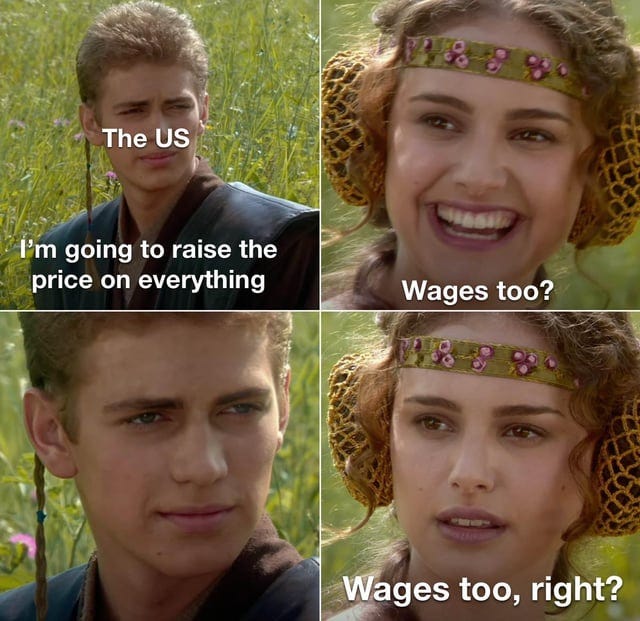Today's issue is sponsored by MHP tenant screening software, RentButter
Start identifying great residents - no matter their credit score
Dramatically improve your mobile home park tenant screening: Schedule a Demo
Man, do I miss cap rate compression.
Buy something, ANYTHING, then just keep the wheels on and watch your exit cap rate plummet (and price skyrocket).
Rinse and repeat until generational wealth.
Well, that game is gone.
The world isn’t going back to zero interest rates.
Excluding some trophy outliers, the 3 cap exits aren’t coming back. Sad.
The brokers who started showing up to conferences passing out “3 Cap” hats were a pretty good sign the party was over.
Most countries spent like a drunken sailor post COVID, racked up insane deficits + levels of debt and now there’s a real cost to money again.
So what’s a mobile home park investor to do?
Well…What's Your Edge?
Find an edge and lean all the way in. Push that edge until you’ve exhausted it.
Yes, lot rents are still far too low relative to apartments and absurdly low relative to new home mortgage costs. But that doesn’t mean passing out lot rent notices is an edge (aka alpha).
But buying at the right price, in the right market and improving the park to justify that increase — ARE alpha activities.
Because if you choose poorly and can’t operate your way out of a wet paper sack, it doesn’t matter what lot rents “should” be.
If you have no — or weak — property management systems to enforce rules and collect the rent, returns will suffer.
And if local wages are stagnant and can’t support reasonable increases at the lowest income levels, your park will first bleed occupancy then cash.
If that happens and the income statement starts tanking, nobody (and especially not the lender) will give a flying hoot about your beautiful MHP investment thesis.
Sources of MHP Alpha
“Okay…I thought this was going to be easier, but fine, so how do I drive alpha?
Alpha largely occurs at purchase or in day-to-day operations.
Today let’s tackle operations.
Operational Alpha
Park-Owned Home (“POH”) Mastery
Most operators run from park-owned homes. I get it, they’re not great. But MHP investors with deep teams and expertise in dealing with “the boxes” tend to consistently drive returns, regardless of capital market conditions.
This is partly because high POH parks often come with:
Cheaper pricing
Seller financing at crazy below-market terms
And (to be fair) much higher operational and capital risk
Many of you have probably said at one time or another “the tenants did WHAT to the home!?!”
This is why you earn (aka deserve) higher returns if you pull off a heavy POH deal.
The most common alpha driver with POH-heavy parks is not the excess cash flow from home rent (which could easily be consumed by cap-ex on turnover or higher maintenance expenses).
The big alpha is reducing a 50%+ POH mobile home park to <30%, dramatically increasing the buyer and lender pool at exit.
But this takes time and is not for the MHP rookie or faint of heart.
It might require an owner to term out the debt to 7-10 years in order to sell down homes as renters vacate. Or they can kick-start this transition by increasing home rental rates faster than lot rents to incentivize renters to buy or vacate.
Other Alpha Drivers in Value-Add MHC:
Infill and Stabilization: Buy underperforming parks with sizable vacancy, infill and reinvest all cash flow until stabilized (within 5 years). This is private equity’s favorite game plan. Utilize balance sheets or bank lines for home infill purchases to accelerate lease-up. In a strong market build up dealer networks, offering them large incentives for their assistance on infill.
Vertical Integration: This is probably the most important value-driver of them all. This reduces costs and dramatically speeds up value-add timelines by controlling the entire labor process. This requires in-house expertise and staff that you control in the following capacities:
home rehabs
home sales
home moving + installation
construction for capital projects and lot expansion
park maintenance
Infrastructure Upgrades: Tackle deferred maintenance or major infrastructure issues (e.g., water, sewer, electrical, roads) to improve park systems and justify higher lot rents. Connecting or converting private utilities to public dramatically increases a park’s buyer and lending pool (increases liquidity, which increases value).
Municipal Negotiations: Use lawyers to negotiate with local cities or counties, horse-trade for expansion rights and/or utility connections or direct billing. For example, if the city maintains the roads, offer to take that over in exchange for something more valuable. You can find surprise cost-cutting measures and buy yourself time if violation notices surface by working with and not against regulators (Big Brother).
Upgrade The Customer Base: improve collections: enforce rules, reduce bad-debt and vacancy loss which all starts with superior tenant screening (shameless but completely valid plug for today’s sponsor RentButter - link below - which is used by many of the largest MHP operators, for good reason).
By focusing on these strategies, the best mobile home park investors control their fate and never need to hope for a cut from the Fed.
Conclusion
Cap rate compression isn’t a tool in an operator’s toolkit. It’s luck. We don’t know where interest rates (and therefore cap rates) are going to be in one year let alone 10 years. Therefore MHP operators need to focus on what they can control to generate reliable returns.
That means obsessing about value creation through operational excellence and relentless execution.
Start identifying great residents - no matter their credit score.
Confidently screen and verify applicants within your favorite property management software.
Happy trails,
MHP Weekly
To advertise with MHP Weekly, email info@mhpweekly.com










